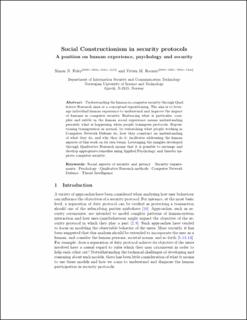| dc.contributor.author | Foley, Simon N. | |
| dc.contributor.author | Rooney, Vivien | |
| dc.date.accessioned | 2021-02-24T09:26:27Z | |
| dc.date.available | 2021-02-24T09:26:27Z | |
| dc.date.created | 2020-10-28T14:22:25Z | |
| dc.date.issued | 2020 | |
| dc.identifier.citation | Lecture Notes in Computer Science (LNCS). 2020, 12287 69-81. | en_US |
| dc.identifier.issn | 0302-9743 | |
| dc.identifier.uri | https://hdl.handle.net/11250/2729987 | |
| dc.description.abstract | Understanding the human in computer security through Qualitative Research aims at a conceptual repositioning. The aim is to leverage individual human experience to understand and improve the impact of humans in computer security. Embracing what is particular, complex and subtle in the human social experience means understanding precisely what is happening when people transgress protocols. Repositioning transgression as normal, by researching what people working in Computer Network Defense do, how they construct an understanding of what they do, and why they do it, facilitates addressing the human aspects of this work on its own terms. Leveraging the insights developed through Qualitative Research means that it is possible to envisage and develop appropriate remedies using Applied Psychology, and thereby improve computer security. | en_US |
| dc.language.iso | eng | en_US |
| dc.publisher | Springer Verlag | en_US |
| dc.title | Social Constructionism in Security Protocols | en_US |
| dc.type | Peer reviewed | en_US |
| dc.type | Journal article | en_US |
| dc.description.version | acceptedVersion | en_US |
| dc.source.pagenumber | 69-81 | en_US |
| dc.source.volume | 12287 | en_US |
| dc.source.journal | Lecture Notes in Computer Science (LNCS) | en_US |
| dc.identifier.doi | https://doi.org/10.1007/978-3-030-57043-9_7 | |
| dc.identifier.cristin | 1842982 | |
| dc.description.localcode | This is a post-peer-review, pre-copyedit version of an article. The final authenticated version is available online at: http://dx.doi.org/https://doi.org/10.1007/978-3-030-57043-9_7 | en_US |
| cristin.ispublished | true | |
| cristin.fulltext | postprint | |
| cristin.qualitycode | 1 | |
